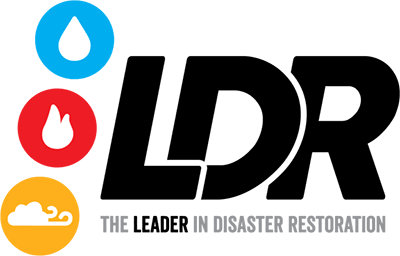Frequently Asked Questions (FAQ)
Jump to service: Water Damage | Fire/Smoke Damage | Storm Damage | Mold Remediation | Biohazard Remediation
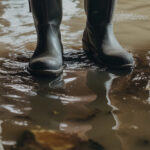
Water Damage
If possible, stop the leak at the source. Call LDR to go out and inspect the property and begin mitigation efforts to prevent further damage and call your insurance company to notify them of your loss.
Drying can include extraction, setting up equipment such as fans, dehumidifiers, air scrubbers, and specialized drying equipment for hardwood floors. When first line mitigation efforts have failed, sometimes removal of the affected material is necessary.
LDR uses special meters that let us know the moisture content of the affected materials. We utilize those readings to monitor and dry according to industry standards.
Most property can be dried within a matter of days and it will likely be unnecessary for you to leave. Since each event is unique, be sure to talk with your LDR Project Manager to get the best idea of a timeline for your project.
LDR advises against opening windows to “help” dry out the property. A controlled environment produces the quickest and most effective results.
LDR will do everything we can to save your flooring. However, there are certain situations that may require replacement such as unsanitary water, how long it was wet, mold growth, type of flooring, etc.
As the customer, you are the primary responsible party for payment. However, LDR will work directly with your insurance company to help attain coverage and minimize any potential out-of -pocket costs.
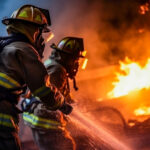
Fire/Smoke Damage
Call your insurance company and call LDR. If needed, LDR will deploy crews to secure the property and help prevent further damage. We will then work hand in hand with both you and your insurance company to fully restore your home or business.
Though you may feel compelled to clean smoke damage yourself, we advise against it. Soot is a hazardous byproduct of burning materials. If not cleaned properly it can cause health issues and damage to inorganic matter. Because it is airborne, soot can get into even the smallest of places. LDR will clean all affected areas as well as filter the air to ensure the safest environment for all occupants.
Depending on the severity of the damage, some or all of your contents may need to be removed and/or cleaned and stored until the repairs are complete. LDR has a Contents Restoration Division that specializes in packing out, transporting, cleaning and storing your contents. You can rest assured that all contents are stored onsite at our secured and temperature controlled warehouse.
Yes. Every item is documented and its location tracked. LDR is able to provide any personal item upon request.
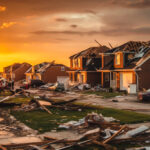
Storm Damage
You first want to inspect your property and make sure there isn’t any damage that could result in further loss. If necessary, LDR will go out and tarp damaged areas to the roof, board up any broken windows and secure any large openings that were caused by the storm. We will inspect your property for damages and work with both you and your insurance to restore your home or business.
No. We do not. If you see a tree on your roof please call a tree removal service. Once the tree is removed call LDR.
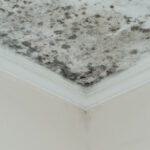
Mold Remediation
Mold is a fungus that typically grows in areas with a lot of moisture.
Over time, mold can breakdown structural materials such as wood and drywall. It can also be hazardous to the health of both humans and pets.
When mold is visible on any porous surface you should contact a professional. When removing mold, the spores can travel through the air contaminating other areas of the property. Containment and specialized equipment is used to minimize any potential health risks. LDR is certified in mold remediation by the IICRC ensuring that your project receives the highest level of care throughout the removal process.
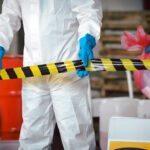
Biohazard Remediation
In places where a traumatic event has occurred or where an organic biohazardous substance has compromised the safety of a location, LDR can remove the affected materials and/or clean and deodorize the affected area.
LDR is IICRC certified in Trauma and Crime Scene clean up giving us advanced training and the highest level of competency needed to deal with biohazardous situations. Upon arrival you can expect our employees to change into all necessary Personal Protective Equipment. We will set up containment before the remediation begins and take it down upon completion. All affected materials will be disposed of according to IEPA standards and regulations.
Whether in a residential, commercial, industrial, educational, or medical setting, LDR can help. We are equipped to perform biohazardous remediation at any of these types of properties.
